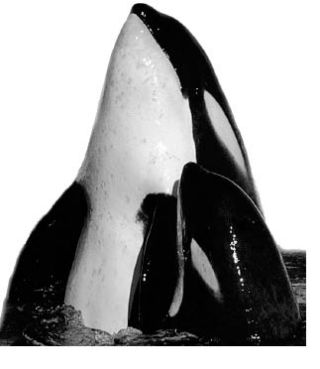Last week I heard that there’s a new arrival in our southern resident orca community! It’s so cool to have these orcas, J, K, and L pods, breaching and blowing between our islands. Puget Sound’s orca population has been declining in the last 50 years, so a new baby orca is indeed good news. Yet in the shadow of this shining event, lingers the doubts that things will improve for these charismatic cetaceans. Orcas prefer to eat salmon whose numbers are also dwindling. Salmon eat smaller fish that use our shorelines for nurseries. We lose more shoreline each year to development, and development often leads to a deteriorating water quality. So the whole food web is affected by many of our activities.
For centuries, Western Washington’s native forests slowed, filtered and stored rain water in wetlands, or slowly released it to streams. It eventually flowed into the largest estuary on the west coast – Puget Sound. Orcas, salmon, forage fish and a host of other diverse aquatic life depend on cool, clean water to thrive. So when our water quality suffers, so do they.
In recent decades, many people have moved to the region. Natural areas are paved and developed. The same rain that once moistened tall cedars and firs, now falls on rooftops, lawns and streets and runs into storm drains carrying grease, grit, pet waste, gas, oil, fertilizers and pesticides. Most of these storm drains carry these toxins directly to Puget Sound.
But wait! Instead of being part of the problem, we could be part of the solution! Use your yard to help clean up Puget Sound. A mowed lawn has only minimal ability to filter and absorb water. This year, get rid of some of that lawn and install a rain garden!
A rain garden is designed to imitate the natural processes of forest and wetlands. It starts with site planning, finding where the water naturally flows on your property and digging a slight depression. Then composted soils are added that allow water to seep into the ground, recharge the aquifer and reduce flooding. The garden plants, usually native species that are accustomed to wet winters and dry summers, filter pollutants. Once they’re established they require little care.
Several rain gardens are incorporated into the landscaping around the new Harbor Station shopping area on Seventh Street and Highway 20 or at Walgreens on Pioneer Way. The new Coupeville High School has a rain garden in the middle of their parking area. By installing a rain garden on your property you’re displaying your concern for Puget Sound.
Rain gardens keep the rain water where it falls. This will help with water quality as well as quantity. With our booming population and rapid development, it’s critical to filter and recharge our sole source aquifer where most of Island County gets its drinking water. So direct your downspouts toward the garden instead of the street.
Rain barrels are another good way to protect our aquifer. They’re a simple, time tested way to collect rainwater. Downspouts that aren’t directed to a rain garden could be directed into rain barrels instead.
Though you shouldn’t use rain water for drinking, those thirsty plants in your vegetable garden would likely appreciate it. It’s estimated that you’d need a roof four times bigger than your garden to catch all the water you’d need. For instance, to water a 20 x 20 foot garden (that’s 400 square feet) you’d need an estimated 1,600 square feet of roof for water collection. A 55 gallon rain barrel alone wouldn’t be big enough. Multiple barrels can be connected or use a larger cistern for serious water catchment. People in other countries and drier states have already gone to using cisterns installed above and below ground to collect rain water.
During these wet weeks in June, it’s hard to imagine that we’ll be experiencing a seasonal drought in August. But like harvesting Hubbard squash and potatoes in October that will last through the winter, the time to collect rain water is now! So slow the flow, make your garden grow and listen to the Orcas blow.
Find out more about rain gardens and rain barrels at a free seminar on Tuesday, June 24, from 6 to 7:30 p.m. at Skagit Valley College, Hayes Hall on the Oak Harbor Campus across from the library. Presenter Stacy Smith of the Whidbey Island Conservation District will share the basics and offer resources for the home or business owner as well as professional landscapers. Please call 360-279-4762 or visit www.oakharbor.org for more information on these free monthly seminars on Sustainable Living.
Maribeth Crandell works on environmental matters for the city of Oak Harbor.



